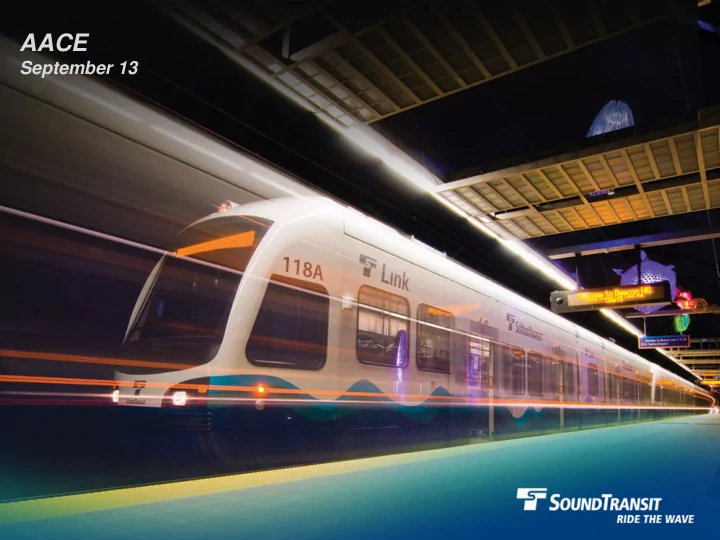

AACE September 13
Today’s Presentation • Overview of Sound Transit and East Link Project • Work to date • Challenges • Track Bridge System 2
Sound Transit District
Sound Transit Program • Transit Investments (to date): – 24 express bus projects completed – 75 miles of commuter rail service – 17.1 miles of light rail service • Additional Investments (2023) – 17% express bus service increase – 8.2 miles of commuter rail service – 36 miles of light rail service 4
2023 Extending the regional light rail system 2021 2023 2016 2016 2023
I-90 bridge lane configuration
East Link Alignment
I-90 Stations Rainier Station Mercer Island Station 8
South Bellevue Station 9
Downtown Bellevue and Hospital East Main Hospital Station Station Bellevue Transit Center 10 Station
Bel-Red Stations 120 th Station 130 th Station 11
Redmond Stations Overlake Village Station Overlake Transit Center Station 12
East Link Working Schedule 13
East Link Status • Preliminary Engineering complete • Final EIS published • FTA and FHWA Records-of-Decision signed • Final Design – Bellevue-Redmond underway – I-90 Fall 2012 • Baseline Scope, Schedule, and Budget 2014 14
I-90 Independent Review Team (IRT) • 2008 State Transportation Budget Proviso – Up to $550,000 for an independent technical review, overseen by the Joint Transportation Committee (JTC), of light rail feasibility across the Interstate 90 - Homer Hadley Floating Bridge. • September 15, 2008 IRT report concluded that: – All issues identified as potentially affecting feasibility can be addressed – Made recommendations for issues to address during design • ST and WSDOT are implementing the IRT recommendations 15
IRT Classified 23 Issues into 6 Categories • General • Stray Current Mitigation Measures • Impact of LRT Track System Installation on the Bridge • Seismic Vulnerability of Approach and Transition Spans • Miscellaneous • Rail Expansion Joint Design and Prototype Testing 16
General • Criteria Established for Independent Review Team to Evaluate Numerous Issues • Washington State DOT’s and Sound Transit’s Goal for the Life Expectancy of Bridge • Additional Needs and Changes Required for LRT Installation to meet “Blue Ribbon Panel” Recommendations 17
Stray Current Mitigation Measures • Sound Transit Adoption of North Link/Airport Link Stray Current Mitigation Design Criteria for Homer M. Hadley Floating Bridge Installation • Stray Current and Cathodic Protection System Interference and compatibility • Determining Strength and Electrical Resistance of Existing Concrete • Modification of Current Bridge Inspection Procedures for LRT Installation • Method for Identifying Stray Current Failure and Response/Repair Plan 18
Impact of LRT Track System Installation on the Bridge • Need for Lightning Arrestors on Floating Bridge and Approaches • Impact of Stray Current Dispersion in Lake Washington on Environment and Fish • Attachment of OCS Supports to Edge of Homer M. Hadley Floating Bridge Deck Cantilevers • Methods to be Utilized for Locating Rebar and Post Tensioning in Bridge Deck 19
Seismic Vulnerability of Approach Spans and Transition Span • Seismic Vulnerability and Seismic Retrofit of Approach Spans and Transition Span • West Approach Tunnel Design Criteria Consistency 20
Miscellaneous • Operational Restrictions for Combination of Train Loading and One - Year Storm Loading from North • Analysis to Confirm Torsional Capacity of the Existing Bridge • Analysis of “North Wind” Storm Effects on Homer M. Hadley Floating Bridge • Operational and Maintenance Coordination Agreement between Sound Transit and Washington State DOT • Median Barrier Relocation Design, Attachment, Maintenance and Drainage • Effect of LRT Installation on Construction Operations Associated with Anchor Cable Replacement 21
Rail Expansion Joint Design and Prototype Testing • Track Bridge/Expansion Joint Design and Performance Criteria • Rider Comfort Performance for LRT Track Bridge at Expansion Joints • Storm Water Drainage System Modifications under New LRT Track Bridge at Expansion Joints 22
Expert Review and Prototype Design • “Since the track bridge is unique…design should be accelerated and [a] prototype tested…” • Prototype design contract awarded in February 2011 • 90% Design in 2012 • Fabrication and testing in 2013 23
Expansion Joint Locations Expansion Joint Locations
Existing Expansion Joint
Range of Motion Range of Motion
Evaluation Criteria Performance • Operating speed • Restricted speeds System Parameters • Reliability/ Maintainability/ Inspection ability • Ease of fabrication Life Cycle costs • Initial costs • Customer Impact/O&M 27
Track Bridge Project Team • Parsons Brinckerhoff/Balfour Beatty Team selected on: – Approach – Experience – Expertise 28
Contracting Approach Phase 1A (Completed November 2011) • Develop Alternatives • Evaluate Alternatives • Select one alternative for Phase 1B Phase 1B (Now through November 2012) • Prepare 90% design document • Develop the testing plan • Component Testing Phase 2 (ST’s option) • Build and test prototype in shop • Full scale field test of prototype Phase 3 • ST’s option 29 • Build actual
Key Contract Features • Meets Independent Review Team Recommendations • Design a prototype • Develop a testing plan • Incentive fee for exceeding goals and milestones • Sound Transit option for awarding future phases – Phase 2 build and test the prototype – Phase 3 build the final track bridge
CESURA CESURA
Where are we now? • Preferred alternative selected • Working towards 90% design • UW testing under way • Full scale testing contract will be considered by ST Board October 32
UW Lab UW Lab
Friction Pendulum Bearing Friction Pendulum Bearing
Engineering Challenge Expansion Joints Prototype Testing Test Facility in Colorado Initial proposal Replicate all movements of Transition Span in Colorado Ship Sound Transit train to Colorado for testing Test joint through all movements; service movement and extreme movement Redesign, fabricate, retest, if required
Testing Program Testing Program Ride quality Evaluation Lateral acceleration on each axle box Car body roll Truck rotation Wheel forces Rail movement and stresses Track bridge stresses Bearing loads rotations, and displacements 36
Questions? Questions 37
Movements Per WSDOT - Vertical • Vertical 2.2 degrees
Movements Per WSDOT - Longitudinal • Longitudinal – Floating +/- 2.05 feet • Longitudinal – Approach +/- .75 feet
Movements Per WSDOT - Horizontal
Recommend
More recommend